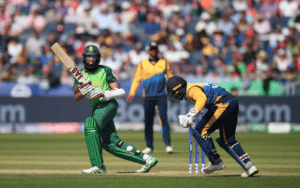The owners of the Qalandars, the Durban franchise in the aborted Global League T20, are refusing to accept the deposit refund and are demanding a stake in the new league recently announced by CSA.
The original T20 Global League was ditched after it was found to be unfeasible without a broadcaster. A new league as been established, scheduled to start in November, to be run by a partnership of CSA and SuperSport. The original eight franchise owners were offered a refund of their deposit, 3.5% interest and a contribution towards costs.
Qalandars CEO Sameen Rana told ESPNcricinfo that they do not want a refund, but a place in the competition and he criticised CSA’s lack of negotiation.
‘We have had a successful experience with Lahore Qalandars in PSL and wanted to grow globally,’ Rana said. ‘We were awarded the rights for Durban franchise with Kingsmead Cricket Ground as our home venue. But after [former CSA CEO] Haroon Lorgat departed things started to fall apart and CSA stopped interacting with us. Reportedly there were a lot of discussions within CSA board without even taking us into confidence, despite us being a stakeholder for the entire project..
Rana said he was ‘surprised’ to hear a new league had been set up.
‘This is a serious breach of trust and contract with us. We do not want our refundable money back, but we require CSA to fulfill the agreement they have signed with us. They also offered us 3.5% interest on the refund along with the reimbursement of expenses incurred. But this is again something we did not demand. We simply need CSA to respect the agreements around the awarding of the franchise to us, which they themselves have given to us in perpetuity. I do not agree to this refund as condition to give up my rights so we will challenge CSA via legal [proceedings].’
All of these reimbursements will cost CSA a further R19.6 million (US$1.44 million) adding to their already depleted stocks. That will bring losses incurred by the board, which were reported at USD 14.1 million last year, to USD 15.6 million (R 212 million).
Photo: Chris Ricco/BackpagePix





